
Research, Purdue, and You!
May 13, 2019 Derek Andrew Pacheco
Each year, the English Department participates in the Purdue Undergraduate Research Conference hosted by the Office of Undergraduate Research (OUR). Its mission is to “promote and expand experiential learning for undergraduate students through research experiences with skilled mentors.” In addition to organizing the conference, OUR offers scholarships, research and travel grants, workshops, online courses, and more. It also sponsors the Undergraduate Research Society, an organization fostering “necessary skills [for students] to be successful in their present and future endeavors.”
English majors participate in the conference via the College of Liberal Arts’ Wilke Undergraduate Research Internship Program. As our website puts it, the program is “intended to nurture a lifelong interest in learning and appreciation of the humanities and other liberal arts disciplines” through participation in faculty research. While assisting faculty, Wilke interns receive a $500 scholarship and enroll in a one-credit seminar on the basics of research. After completing their internship, they present at the conference poster session. Recently, students have aided faulty research on pirates, The Hobbit, digital humanities, Milton in translation, black feminism, bioethics, science fiction, museum archive studies, writing tutoring, and more!
Why does student research matter? As one of eleven “high impact” practices central to undergraduate education, its benefits are wide-ranging. Long-term faculty-student mentoring, like working on a thesis or capstone project, helps post-college success. As Leo Lambert tells us, there is a “strong relationship between key experiences in college and outcomes after graduation, such as engagement at work and personal well-being…. The quality of your collegiate experience will make a meaningful difference in the quality of your life!”
Other studies demonstrate that research encourages critical thinking; fosters independence; promotes the ability to tackle problems with no easy solutions; and provides a sense of accomplishment, positioning students for their next challenge (Selingo 152). Similarly, “students who were academically challenged in college are 2.4 times more likely to say college was worth the cost and 3.6 times more likely to say they were prepared for life outside of college” (Lambert). OUR also claims: “Studies show that students who engage in research are more likely to graduate, more likely to go on to graduate school, and have more successful careers after graduation.”
Finally, research is great career-builder. You can use it in your resume, cover letter, and interviews to market yourself to “companies, graduate programs, and national service organizations” (OUR). Add to this the fact that presenting at a poster session sharpens time management, networking, and public speaking skills, and you can see how undergraduate research is a pretty big deal!
What do Purdue English majors have to say about the Wilke program and the research conference?
Name: Hollis Druhet, Vitasta Singh, & Grace Morris
Majors: English Literature & Creative Writing
Research Area: Cognitive Literary Studies with Prof. Pacheco
Tell us about your research project.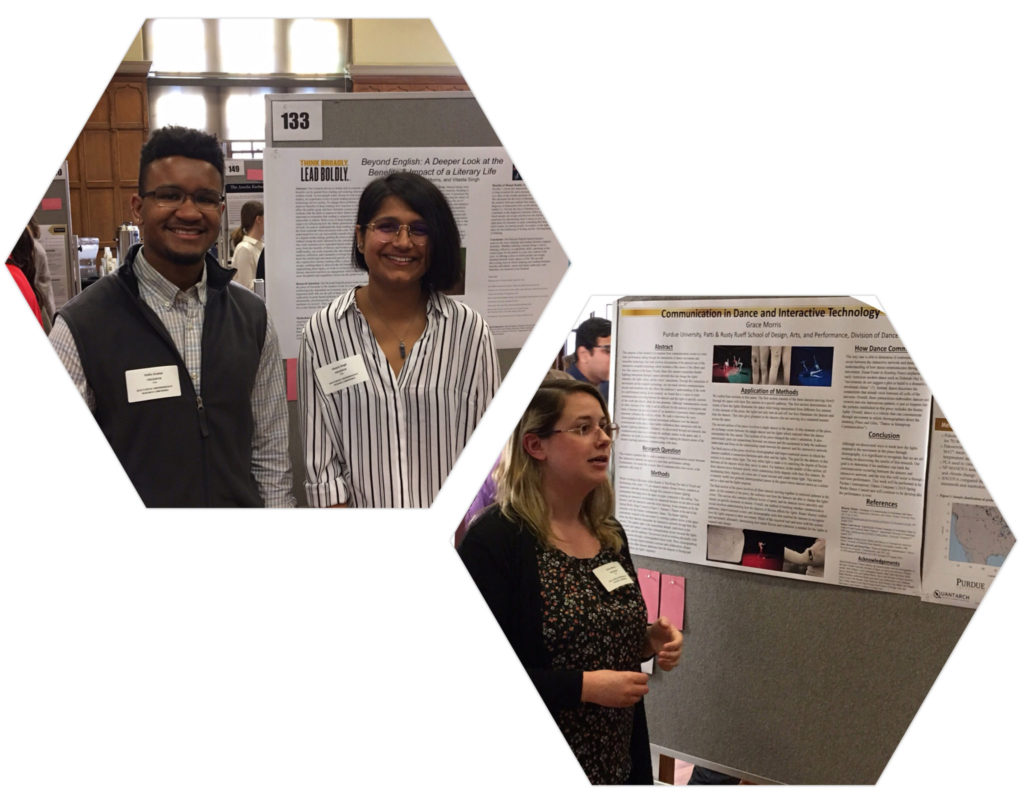 We looked at the social, emotional, and psychological benefits of reading literature. Reading isn’t epigenetic; while language is inherited from one generation to the next, reading is not. So, we wanted to understand how modern digital media alters the reading brain. In a digital age, we need to figure out how to train our brains to consciously retain the skills provided by deep reading while interacting with new media.
We looked at the social, emotional, and psychological benefits of reading literature. Reading isn’t epigenetic; while language is inherited from one generation to the next, reading is not. So, we wanted to understand how modern digital media alters the reading brain. In a digital age, we need to figure out how to train our brains to consciously retain the skills provided by deep reading while interacting with new media.
What was it like presenting a poster at the Undergraduate Research Conference?
It was awesome to be somewhere people were excited about research. We got to see what other students were doing, and to communicate the value of our research to them. It was really cool to have them come up and say, “That looks interesting. Let’s hear more.” The presentation got us thinking about how to communicate information to different demographics. A big part of the experience was…understanding how academic professionals could be better at communicating their ideas to a wider audience.
What did find you find most valuable about the Wilke Research Internship experience?
It was a great experience. We received guidance and support, but were also able to move through the project on our own. We also liked working together as a group. It doesn’t matter what career you pursue; you’re always going to have to learn how to fit your perspective alongside your partners’ or coworkers’. It was challenging…but we enjoyed it. We liked being challenged. That’s what’s great about the Wilke; you’re going to be challenged.
Name: Ally Geoffray
Major: English Literature
Research Area: Digital Humanities with Prof. Felluga
Tell us about your research project.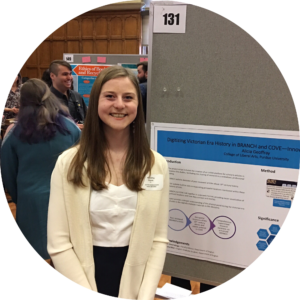 I worked on website called COVE, The Central Online Victorian Educator, creating a map with pinned geospatial locations of key nineteenth-century places and events. Our goal is to create a comprehensive hyperlinked research database that offers a more centralized platform for building shared knowledge, which we hope will help sustain the humanities in academia.
I worked on website called COVE, The Central Online Victorian Educator, creating a map with pinned geospatial locations of key nineteenth-century places and events. Our goal is to create a comprehensive hyperlinked research database that offers a more centralized platform for building shared knowledge, which we hope will help sustain the humanities in academia.
What was it like presenting a poster at the Undergraduate Research Conference?
I was nervous going in, but fellow undergraduate presenters gave me advice [on how to stay focused and exude confidence] and the judges themselves were very kind and interested in my research. They asked questions about my project and provided some feedback about my presentation, and then I was free to walk around and view other students’ work.
What did find you find most valuable about the Wilke Research Internship experience?
The best part of my research internship was working with Dr. Felluga and Amy Elliot, my graduate student supervisor. Working with them to develop my skills—both in researching and in presenting—was a very valuable experience. This project has also cultivated my interest in Victorian studies, and has taught me so much about integral locations from this time period.
Daniel Krause Daniel Krause
Name: Daniel Krause
Winner, “Poster Presentation Award”
Major: Social Studies Education (and English Minor)
Research Area: Literary Studies with Prof. Powell
Tell us about your research project.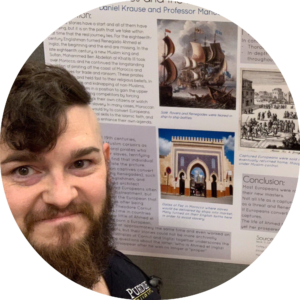 My research is on narratives of the Barbary Coast, including an individual named Ahmed the English. He was an Englishman born in the late 1600s who became a Renegade, a European who converted to Islam. We have no record of his existence before he became a Muslim [and very little after].
My research is on narratives of the Barbary Coast, including an individual named Ahmed the English. He was an Englishman born in the late 1600s who became a Renegade, a European who converted to Islam. We have no record of his existence before he became a Muslim [and very little after].
What was it like presenting a poster at the Undergraduate Research Conference?
It was my first time doing a presentation, and so I was a little nervous…. In the morning session alone, there were probably 300-500 people, packed in like sardines! So, you have a lot of people moving around, a lot of talking. But it was also fun because I got to hear about other students’ research, and to network with people in the Wilke program.
What did find you find most valuable about the Wilke Research Internship experience?
Being in the military, it was a completely different world coming back to school. I never imagined that I would be doing research. I found out that, not only am I really good at it, but I also enjoy it! I liked having Prof. Powell push me to find new and different information that other people haven’t. It was exciting…to do this research that no one else had done before.
Name: Josh Martin
Major: English Literature and Linguistics
Research Area: Linguistics with Prof. Benedicto
Tell us about your research project.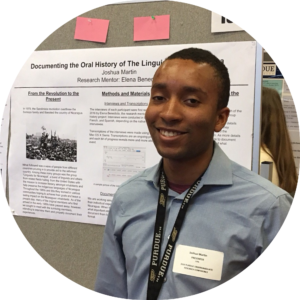 I documented interviews with the original members of Linguists for Nicaragua…a group of U.S.-based students who went to Nicaragua to assist in improving literacy and documenting the indigenous languages following the conclusion of the Nicaraguan revolution. My work involved transcribing these interviews as well as preparing a website detailing the story of Linguistics for Nicaragua.
I documented interviews with the original members of Linguists for Nicaragua…a group of U.S.-based students who went to Nicaragua to assist in improving literacy and documenting the indigenous languages following the conclusion of the Nicaraguan revolution. My work involved transcribing these interviews as well as preparing a website detailing the story of Linguistics for Nicaragua.
What was it like presenting your poster at the Undergraduate Research Conference?
It was an interesting experience! Admittedly, I was nervous about presenting my work since I’d never done a poster session before…Nevertheless, I was great to have a chance to showcase my work to others, and to introduce people to something that they might not be knowledgeable of.
What did you find most valuable about your research internship experience?
My internship did give me a lot of experience with working in a research lab, which I found valuable as someone who plans to go to graduate school…I also managed to get experience in using certain programs, such as ELAN, in performing the research that we do. All in all, I feel that it helped provide the exposure to lab work needed to do other projects going forward, which I look forward to!
Sarah Merryman Sarah Merryman
Name: Sarah Merryman
Major: Professional Writing
Research Area: Writing Lab with Prof. Denny
Tell us about your research project.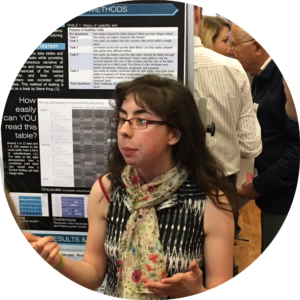 I evaluated the OWL’s data tables for accessibility to color blind and motor-impaired users. I conducted usability testing by asking students to go through the tables and complete series of tasks, while recording them to track movements and also to hear their vocal responses. The color blind tests revealed that we should make changes to the site based on user feedback, but the motor-impaired usability was pretty decent.
I evaluated the OWL’s data tables for accessibility to color blind and motor-impaired users. I conducted usability testing by asking students to go through the tables and complete series of tasks, while recording them to track movements and also to hear their vocal responses. The color blind tests revealed that we should make changes to the site based on user feedback, but the motor-impaired usability was pretty decent.
What was it like presenting a poster at the Undergraduate Research Conference?
Presenting was a super interesting experience! It was fun to share my research with students from different majors. The symposium was much louder than I anticipated, so I recommend students practice projecting before they present. It also wears out your voice, so bringing a throat lozenge.
What did find you find most valuable about the Wilke Research Internship experience?
My mentor taught me how to write abstracts and prepare research presentations for different audiences. What I loved most was discovering that research extends beyond the classroom, and realizing that I could pursue research independently. If you are curious about a topic or want to find answers to a problem, find a research mentor willing to help you and go for it!
Works Cited
Lambert, Leo. “The Importance of Helping Students Find Mentors in College.” Gallop.com. 29 Nov 2018. https://news.gallup.com/opinion/gallup/245048/importance-helping-students-find- mentors-college.aspx.
Selingo, Jeffrey. College Unbound: The Future of Higher Education and What it Means for Students. New Harvest, 2013.